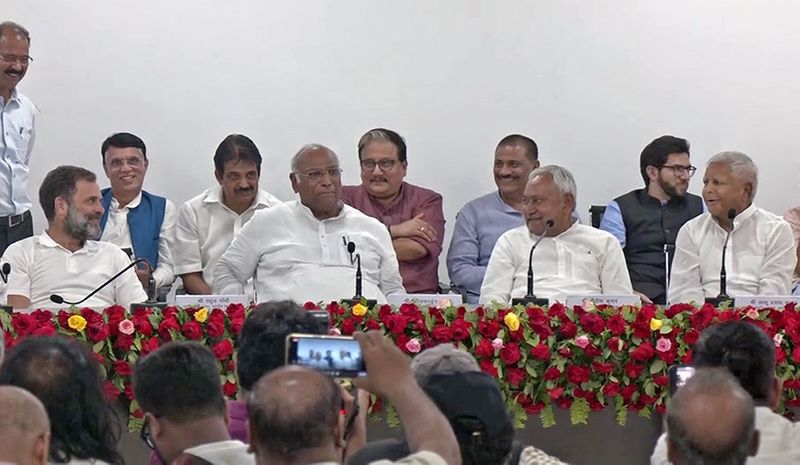Last week in Bihar’s capital Patna, the first major meeting of opposition leaders made headlines. Old friends, old foes had come to the same table with great difficulty to set in motion the first steps towards a united front to take on the BJP in next year’s Lok Sabha elections.
This effort was largely thanks to Chief Minister Nitish Kumar who worked for weeks to bring the disparate voices on board. At the meeting itself, things were going pretty well until it descended into a spat between the Congress and the AAP.
Sources say Delhi Chief Minister Arvind Kejriwal was insistent that the Congress party take a public position on a controversial ordinance passed by the central government recently which effectively undermines his authority over Delhi by giving two bureaucrats the final say on governance issues.
Sources say Congress President Mallikarjun Kharge assured Mr. Kejriwal that the Congress would not support the ordinance in parliament, where it needs to be passed. But Mr. Kharge said the party would have to formally approve this step at an internal meeting before the next parliament session in mid July, so a public stand right now was not possible. Mr Kejriwal however dug his heels in and insisted the Congress should do it his way.

A big chink in the armour
This lead to ugly breakdown where several other opposition leaders stepped in and asked the AAP to take a more reasonable approach. Before that, Mr Kharge had shown Mr Kejriwal comments made by an AAP spokesperson that very morning accusing the Congress of working in support of the BJP on the ordinance issue.
The timing of the AAP attack on the morning of the opposition meeting raised many eyebrows. At the end of the meeting, the AAP refused to be part of a joint press conference and openly blamed the Congress for it. Later AAP leaders said Kejriwal had sought a separate meeting with Rahul Gandhi to discuss this tricky issue one on one but that Rahul refused.
This dissonance between the AAP and the Congress in the opposition camp is a big chink in their armour and it has left many other opposition parties exasperated. The Patna meeting was not easy to do. And here were two key constituents at loggerheads.
In its phenomenal growth over the last decade , the AAP has largely succeeded where the Congress has weakened, a story that is most stark in Delhi. It is no wonder that Delhi Congress leaders like Ajay Maken and Sandeep Dikshit have no love lost for AAP and are vehemently opposed to any tie up with the party.
The rise of AAP at the Congress’ expense in Punjab and Gujarat makes the grand old party wary. The fact the Kejriwal may contest more state elections which have traditionally been Congress vs BJP fights has thrown another spanner.
This inherent mistrust is why the senior Congress leadership has been confused about what position to take on issues like the Delhi ordinance. The Congress knows that the controversial ordinance undermines an elected government and on principle it is a cause that must unite all parties.
A positive step forward
But leaders like Maken are dead against any support. For the Congress what should make its final decision easier is the principle - the undermining of an elected government which in turn hurts India’s democracy. This is what forced the AAP to strongly criticise Rahul Gandhi’s disqualification from Parliament as an MP.
Or what brought opposition parties together when investigating agencies like the Enforcement Directorate went after political rivals of the BJP.
Despite the bickering in Patna, the fact that the opposition has decided to meet again in Shimla in July is a positive step forward. There is enough time till then for back channel work to take place to try and bridge some gaps.
The question is whether the Congress and the AAP can overcome this trust deficit and have some sort of strategic pact for the polls.









